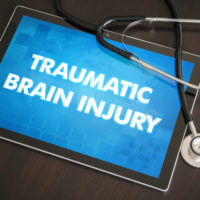What are the Types of Traumatic Brain Injuries, and How Do They Affect Accident Victims?

Getting into a major motor vehicle accident or being injured in a slip-and-fall can not only affect how a victim’s body functions; it can also change the way they think and perceive the world. Injuries to the brain can vary greatly in effect and severity. Victims and their families should understand the full impact of these injuries and what is required to treat them so that they insist on receiving full compensation after an accident someone else caused. Read on to learn more, and contact a seasoned West Virginia personal injury attorney after a serious accident.
Traumatic Brain Injuries, Explained
Traumatic Brain Injuries (TBIs) are the result of the brain suffering a blunt force trauma or sudden jolt, or some other force doing damage to the tissue of the brain itself. Cerebrospinal fluid surrounds the brain and can normally prevent injuries caused by the brain making contact with the skull, but when a blow is too violent, the fluid is unable to absorb the shock, and the brain is damaged by the skull. These types of TBIs commonly occur as the result of a fall, motor vehicle accident, incident of violence, or other blunt force impact. When TBIs are more severe, the brain may bleed due to the impact, resulting in what’s known as a contusion. In more serious accidents, the brain may experience a puncture wound from a foreign object penetrating the skull. Very violent jolts can result in tears in the brain matter, known as diffuse axonal injury. These injuries can result from serious car, bicycle and motorcycle accidents.
Effects of TBIs
Victims of major TBIs can suffer not only physical changes, such as paralysis, seizures, loss of coordination, and sensory impairment, but also cognitive and emotional changes. TBI victims may experience:
- Mood swings and an inability to control their anger
- Forgetfulness
- Inability to speak, remember words, or understand others when they speak
- A shortened attention span
- Poor judgment
- Poor social skills
- Difficulty with problem solving or high-level thinking
- Depression
Injury victims may require extensive therapy to regain all or part of their previous functioning, and may need in-home care after a serious accident. Victims of TBIs and their families should speak with an experienced personal injury attorney to receive a knowledgeable valuation of their claim, to ensure they are fully compensated by an insurer or at-fault driver after a brain injury.
For assistance with your accident claim after a car accident or slip-and-fall in West Virginia, contact the compassionate and effective Martinsburg personal injury lawyers at Burke, Schultz, Harman & Burke for a free consultation on your case, at 304-263-0900.
